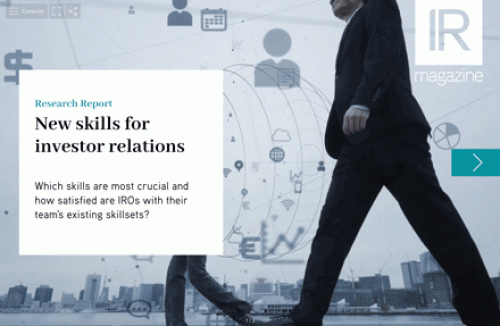The sense that a role in IR is a life-long vocation is waning. Not only are IROs some of the most visible people in their organization, both internally and externally, but the role also provides unparalleled exposure across the functions of a publicly traded firm.
It’s perhaps no surprise then that the route from IR to the C-suite is becoming well worn. But where the CFO chair was once seen as the default destination for IR professionals, the CEO role is less frequently considered.

Indeed, a survey of 667 IROs in IR Magazine’s Global IR Salary and Careers Report 2022 finds that ending up in the C-suite or on a company board is the least-important career aspiration for those polled: just 42 percent say it’s of high importance, while more than three in 10 IROs rate their feelings about that particular path as ‘indifferent’ at best.
It might be that IR is a very fulfilling vocation, or that those in the role are modest about their aspirations. But Oskar Yasar, managing partner at IR and corporate affairs recruitment firm Broome Yasar, says it could be because many IROs don't even realize they could end up as a CEO.
‘As an industry, we should all realize that we’ve come a long way,’ he points out. ‘IR is no longer just a back-office function. It’s now at the forefront of corporate positioning and strategy.’
Paths to the top
Smooch Repovich Reynolds, CEO of executive search company Smooch Unplugged, says IROs tend to come to the top seat via one of two paths.
‘There are those who just inherently know they want to become a part of the upper echelon of the C-suite,’ she explains. ‘And then there are those who discover it along the way, when their bosses place them into unexpected roles they would never have taken on for themselves.’
Reynolds describes the second route as ‘oftentimes a more enriching career path’ than the alternative because it is less ‘tightly scripted and architected’. She adds: ‘In my opinion, people don’t get 10 or 15 years into their career and say, I want to be a chief executive. Most people are thinking maybe five or seven years ahead.’
She tells an anecdote about meeting the CEO of an industrial firm for which she was seeking a head of IR. Earlier in his career, he had served as IRO himself, but said he went ‘kicking and screaming’ to the role after his CFO asked him to take up the mantle.
Later, says Reynolds, he said his time as an IRO ‘was the single best chapter of preparation’ for his path to CEO. ‘It’s a great example of someone who did not architect his career path to the CEO chair,’ she says. ‘But it is also an example of how time as an IRO can open the door for other things.’
This feeling is shared by Gerbrand Nijman, former head of IR at telecoms firm VimpelCom and life insurer Aegon and now CEO of Global Telecom Holding. He says he sees IR as the perfect preparation to becoming group CFO – a role he took up in 2015 – thanks to the knowledge and skills it brought him along the way.
‘There’s no other position, in my opinion, that suits that transition better than IR, because you bring knowledge of the capital markets and of your sector and, over time, you develop both of those further,’ he notes.
‘It’s a fantastic step for your career. You can learn so much. Too often a CFO or CEO has been appointed at a listed company without that experience, and it can take at least a year to get up to speed.’
This is an extract of an article that was published in the Summer 2022 issue of IR Magazine. Click here to read the full article.










